Best I Faced: Charlie Magri
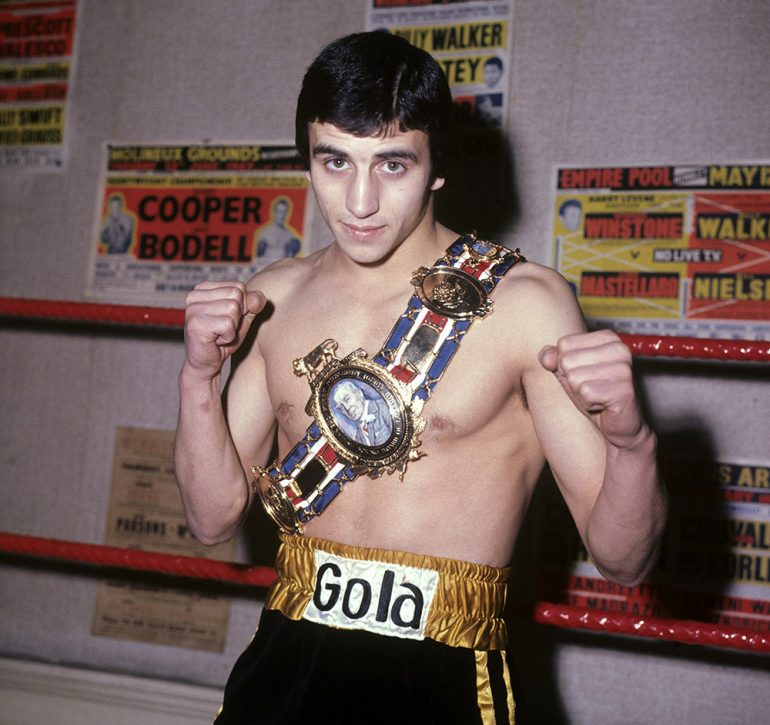
Charlie Magri was a top amateur before turning professional, where he briefly held the WBC flyweight title.
Magri, who was the youngest of five boys (seven siblings in total), was born in Tunis, Tunisia, to parents of Maltese descent on July 20, 1956. His birth name was Carmel Magri. His family moved to live on the Burdett Estate in Mile End, in the East End of London, for a better way of life when he was 2 years old.
“It was a lovely area, but there were some hard boys about. But they all came to see me fight,” Magri told The Ring. “It was a good place for me, because I had four brothers. I was the youngest, so I had no problems.”
When Magri was 11, he went into the Arbour Youth Boxing Club, in nearby Stepney, with his elder brother Walter.
“I started punching the bag and the manager shouted, ‘Oi, oi, what you doing? You can’t do that until you join the club.’ I said, ‘I’ll join the club,'” Magri recalled. “This was Friday night and he said to me, ‘Come back Monday.’ I came back the next day, Saturday. He said, ‘What are you doing? I told you to come back Monday.’ I said, ‘I want to do it as quick as I can. I want to get involved.’
“I used to walk through the estate every night to get to my club; it was about a mile and a half. I used to love it; all the boys were playing football on the grass and as I walked past, they used to say, ‘Where you going, Charlie? Going boxing?’ They were all interested in what I was doing. I was well recognized in the area and had a lot of support at my fights.”
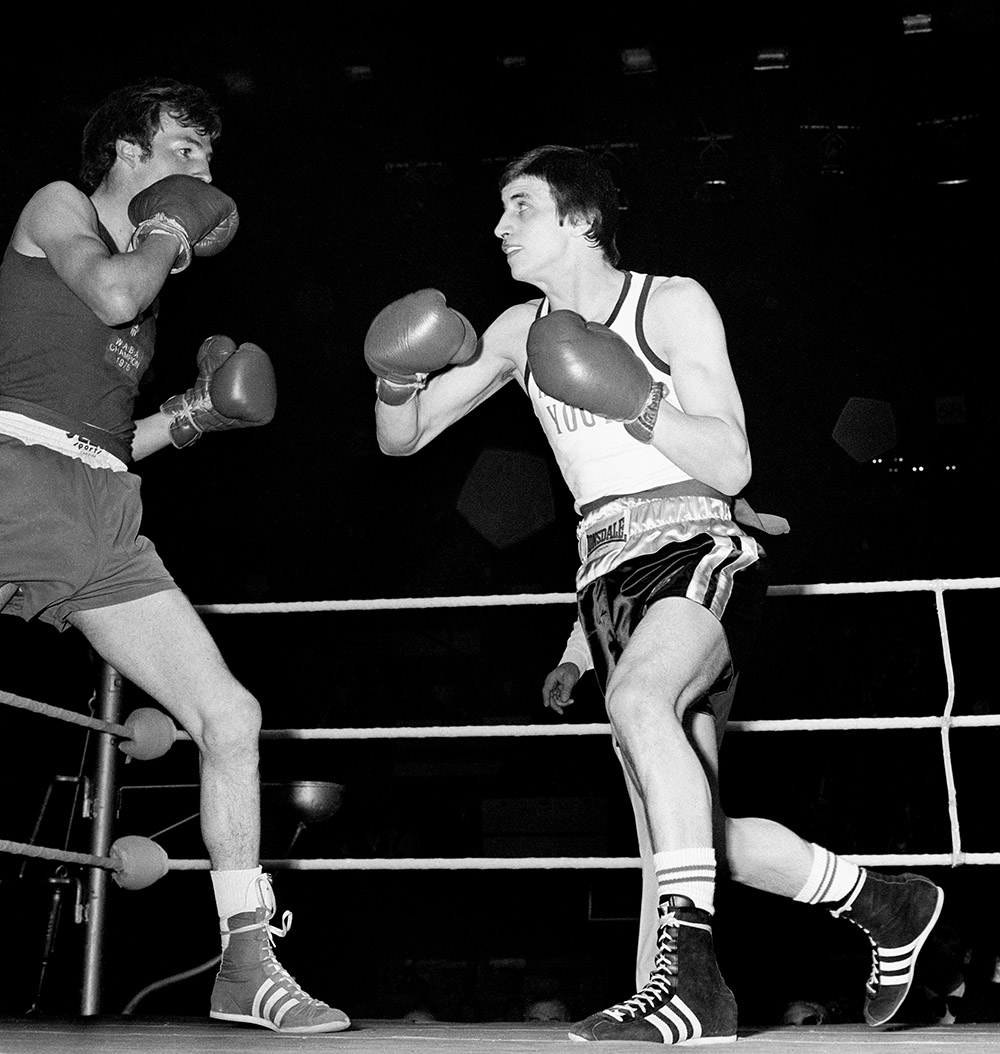
A young Magri (right) in action as a member of England’s amateur boxing team. (Photo by PA Images via Getty Images)
After leaving school at 15, Magri began working as a tailor’s cutter in Aldgate near Central London.
He excelled as an amateur, winning six ABA titles at Youth and Senior level. He won silver at the 1974 European Junior championships and bronze the following year.
The talented youngster went on to represent Great Britain at the 1976 Montreal Olympics.
“That was a disaster. I boxed a Canadian kid, Ian Clyde, and he stopped me,” Magri explained. “He caught me with a good shot; he was a southpaw and hit me with a right hook, left hand. I got up – the clock was behind me – I stepped back to see what the clock was doing. I only had about 40 seconds to go. As I stepped back, I wobbled and they stopped it. It was the third round. I think I was ahead at the time. You never know; you’re in Canada boxing a Canadian.
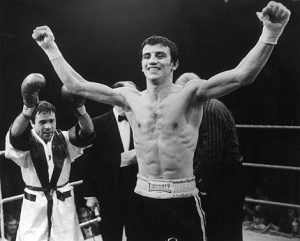
Magri celebrates his victory over European champ Franco Udella. (Photo courtesy the WBC)
“It was great [experience], but [losing] upset me. I felt like packing it all in. I did for a couple of months and then I went back, and a little bit after that I turned pro.”
Magri, who went roughly 95-10 as an amateur, turned professional under Terry Lawless’ management in October 1977. He moved quickly.
“I had my first fight against Neil McLaughlin from Ireland; I knocked him out in two rounds,” said Magri, who was paid £500 (around $885 at the time) for his debut. “My next fight was Bryn Griffiths, who I boxed in the amateurs, and I knocked him out in two rounds in a British title eliminator. Then my third fight was Dave Smith, who I beat in the finals of the ABAs. He had a lot of experience as a pro and I put him down about five or six times and knocked him out in seven rounds. It was very good. I’m well proud of that.”
Magri had won the British title in his third fight, just six weeks after turning professional. He equaled Dick Smith’s 63-year-old record for becoming British champion in the fewest number of fights.
The impressive nature of his feat was recognized with a Best Young Boxer award from the Boxing Writers’ Club shortly afterwards.
“Champagne Charlie” became a fixture at the Royal Albert Hall over the next 18 months, moving his record to 11-0. Reigning European champion Franco Udella came to London in May 1979.
“He was a good fighter. He was getting on a bit,” said Magri. “He was a tricky fighter; he was ducking and diving, tucking up. He was very experienced; he boxed for a couple of world titles. I beat him quite comfortably on points.”
Three defenses and several non-title bouts followed over the next couple of years. Magri notably bested battle-hardened future world champion Santos Laciar in December 1980.
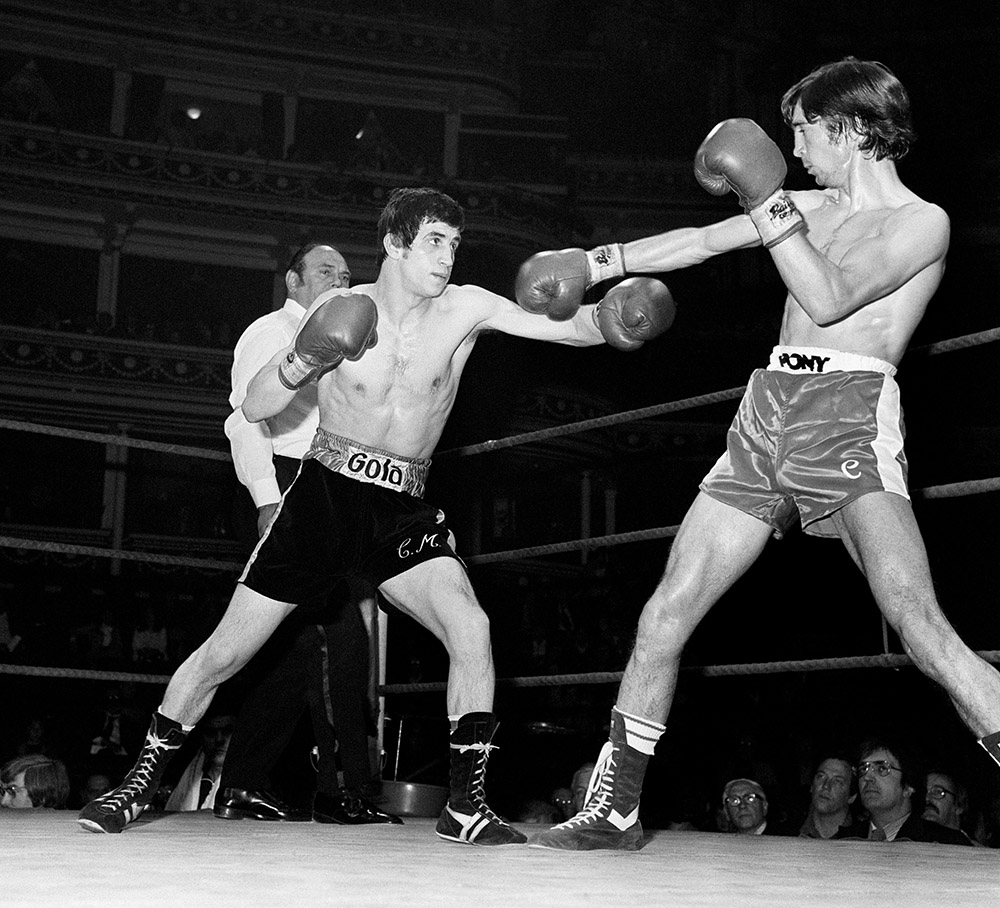
Magri en route to an eight-round points victory over Manuel Carrasco in 1978. Magri would defeat Carrasco again the following year. (Photo by PA Images via Getty Images)
“He was shorter than me, and that’s saying something,” he quipped. “He’s stocky and he came out the first round and threw a right hand that put me on the floor, but I got up and concentrated on keeping my hands up and keeping my distance, and I beat him on points. And [two] fights after, he won the world title.”
Magri was nearing his own world title shot but surprisingly came unstuck against veteran trial horse Juan Diaz in October 1981.
“He was nothing special, but he had power, and I just happened to be in the way. I should have been careful,” said Magri, who was knocked out in the sixth round. “I was winning the fight, and all of a sudden he caught me by surprise. I went down and didn’t get up until after the count was over. I thought, ‘That’s done me up.'”
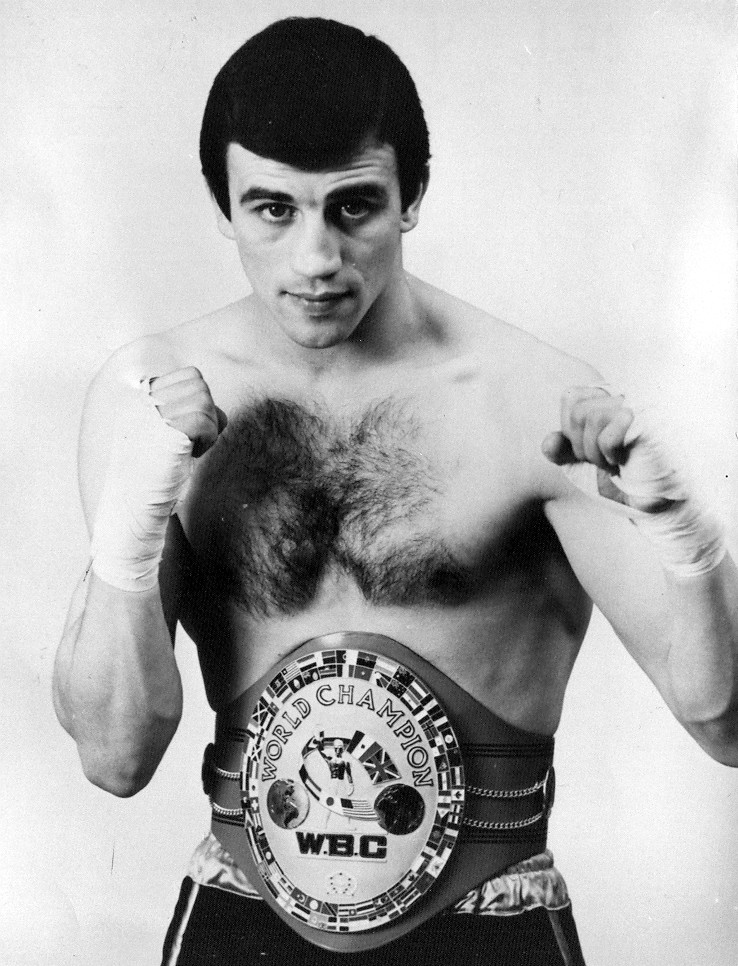
Magri as WBC flyweight champion. (Photo courtesy the WBC)
After two rebound wins, Magri suffered another setback, this time at the hands of tough American Jose Torres in May 1982.
“He was very cocky. He held me and confused me,” Magri admitted. “He was gangly, tall, very awkward; he’d grab you by the neck and throw you on the floor.
“I knew I could beat him, but on the night my form was off. I wasn’t concentrating. I said to Terry Lawless, ‘If you don’t get me a return with this geezer, I’m going to pack up.’ He went, ‘Do what you want son.’
“Anyway, he got me a return. I boxed him again and I beat him.”
In March 1983, British promoter Harry Levene brought Ring/WBC flyweight champion Eleoncio Mercedes to Wembley Arena in London.
“He was a very good fighter. I didn’t beat him up. He was still comfortable, but I was winning the fight. I cut his eye and think I would have won the fight if it had carried on,” said Magri, who was ahead on two of the scorecards at the time of the stoppage in Round 7.
Unfortunately for Magri, he dropped his titles six months later in his first defense against Frank Cedeno.
“I didn’t know the guy, I didn’t study him, I didn’t look at his record – I didn’t know anything about him,” said Magri, who went down three times in Round 6, forcing the referee to stop the contest. “I don’t know, there was no excuses. He caught me and I went down. What can you do?
“He was tough, a southpaw, big puncher. Just one of them things. I think I was winning the fight and got caught with a good shot.”
After some time off, Magri bounced back to regain his old European title on cuts against previously unbeaten Franco Cherchi in Italy.
via Pinoy Nation Boxing Channel on YouTube:
Magri was offered a shot at his old WBC belt, which was then held by Thai fighter Sot Chitalada, and the pair clashed at the Alexandra Palace in London in February 1985.
“My manager didn’t want me to fight on that bill; it was a Frank Warren show,” Magri recalled. “I never knew anything about money in my fighting career. We had a meeting in my shop (Charlie Magri Sports) and [Warren] told me and Terry Lawless what I was getting. I was happy with it, and that’s the reason I took the fight, but my manager didn’t want it. I went against him.
“I gave [Chitalada] a really good fight. When I got cut, [Lawless] stopped [the fight] and threw the towel in [at the end of Round 4]. I hurt [Chitalada] a couple of times. I’m not saying I’d have done him, but if I’d caught him a few more times it might have changed. He was world class.”
via tuxtucis on YouTube:
Later that year, Magri returned to Italy to face Cherchi for the European title in a rematch.
“[The] first time, we clashed heads and it was stopped and they wanted a return, and 10 months later I boxed him again,” Magri said. “This time, I knocked him spark out. He was over the ropes, laying down. I counted to 16 and he was still down on the floor.
“After the fight, the promoter’s son come up to me and said, ‘Were you happy?’ I said, ‘No, not really, the money isn’t very good.’ He told me how much I was getting, Terry Lawless gave me half of that and he still took 25 percent.”
Several months later, he met British titleholder Duke McKenzie for both titles. It proved a step too far, and Magri lost in five rounds against the younger, fresher fighter.
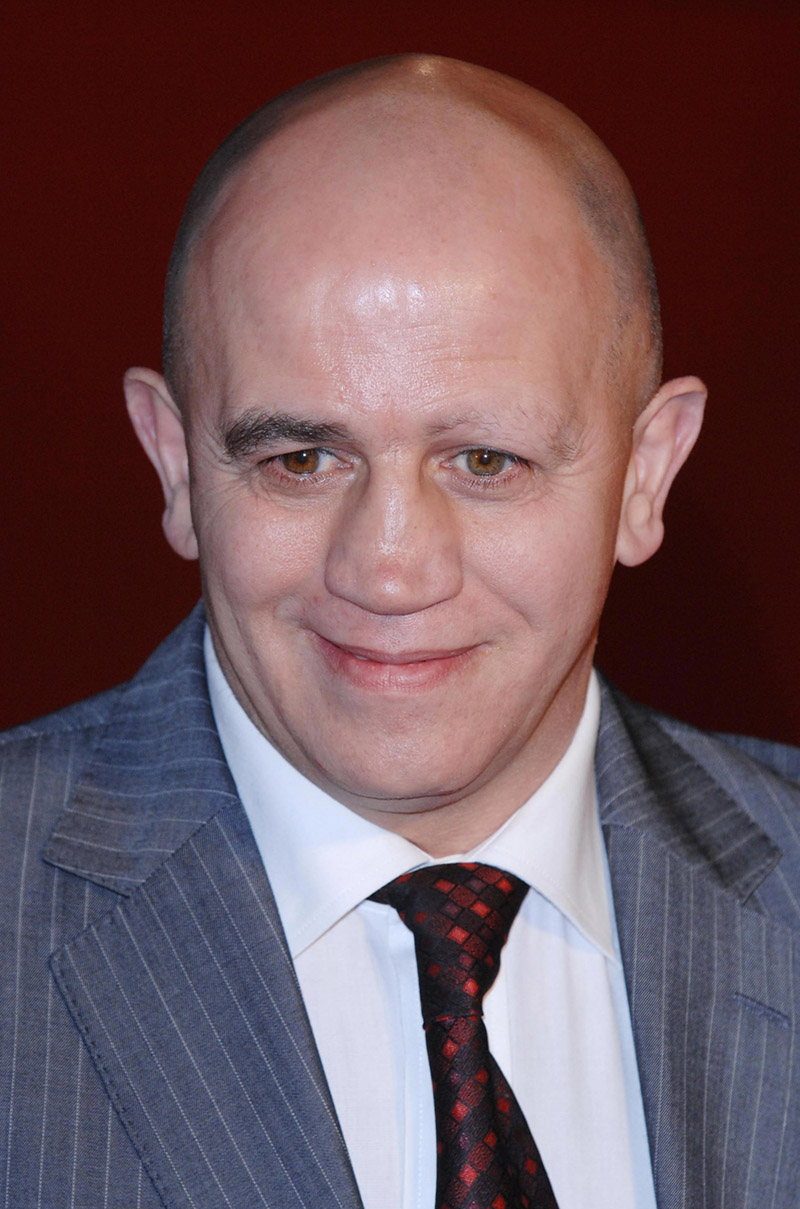
Magri at the premiere of Rocky Balboa in 2006. (Photo by rune hellestad/Corbis via Getty Images)
“[McKenzie] was with Micky Duff and he was Terry Lawless’ best friend, and they were partners in promoting the shows and he put me off the fight,” said Magri. “[Lawless] just ignored me. I was in the corner on my own. He didn’t talk to me; he was talking to Micky Duff and laughing. I got in there and couldn’t get going. If I boxed like I usually do, I could have hurt him. My style would have suited [this fight]. [McKenzie] turned out to be a good fighter in the end.”
“I wasn’t clued up. I used to say, ‘What am I getting for the fight?’ And [Lawless] used to say, ‘Don’t worry, mate. Just get in there and do the work and I’ll sort it out later.’ He never, ever told me how much I was getting.
“I was the champion, but Duke McKenzie got the 60/40 [split]. [Duke] told me that when I met him. After the fight, Terry Lawless got in my face and shook my head and said, ‘You know what you’ve got to do now? Get off your fucking arse and go work for a living.’ I just got beat and I’m upset.”
Magri never fought again, retiring with a record of 30-5 (23 knockouts).
“It was very hard. My education wasn’t great,” he said. “I had to get myself a job. I got myself together and worked for the council and stayed there for nine years. I ran the Victoria pub for 12 years. Lived on my pension and money I had.”
Magri, now 67, is divorced, has two children and four grandchildren and lives in Limehouse, London. There is a book on his life and career called Champagne Charlie.
He graciously took time to speak to The Ring about the best he fought in 10 key categories.
BEST JAB
Sot Chitalada: “He was class. He was like a Muhammad Ali-type fighter. He used to dance about a bit. His jab was very quick; it was powerful enough.”
BEST DEFENSE
Manuel Carrasco (UD 12, December 1979): “I went eight rounds and I went 12 rounds with him when I boxed him for my European title. I went 20 rounds with him. He was very strong and durable. I bashed him, I must have won every round, but he wouldn’t give up and he had a good defense. He was tall and tucked up on the ropes. He held me quite a bit; he was very awkward.”
BEST FOOTWORK
Eleoncio Mercedes: “He was very slick. I stopped him in the seventh [on cuts], but he was hard to catch.”
FASTEST HANDS
Chitalada: “Very fast, very quick. He punched hard as well.”
SMARTEST
Santos Laciar: “He was a classy little fighter. He was clever, he stayed with me and he was tucking up. I thought he was going to be easier to handle, but he was much better than I thought. He grew in experience and he was world class.”
STRONGEST
Frank Cedeno: “He was very strong; he was hard and tough. He put me down and stopped me in six rounds.”
BEST CHIN
Franco Udella: “I caught him a few times, and every time I’ve done it to other people, they’ve either gone down or been stopped.”
BIGGEST PUNCHER
Juan Diaz: “He was nothing special, but he was tough and he could whack. He was such a hard puncher, it was unbelievable. He caught me with a good shot and caught me by surprise.”
BEST BOXING SKILLS
Alfonso Lopez (W 10, September 1980): “He went the distance with me. He was a world champion before I boxed him. It went 10 rounds. He was very skillful. He got away from a lot of trouble.”
BEST OVERALL
Chitalada: “He was like a miniature Muhammad Ali; he was dancing around, he was teasing me and feinting shots. He was very good. His skill, he had the punching power, he had the ability to duck and dive and move around. He was class. He was a difficult opponent. I gave him a good go until he stopped me.”
More “Best I Faced” articles on RingTV
Questions and/or comments can be sent to Anson at [email protected].















